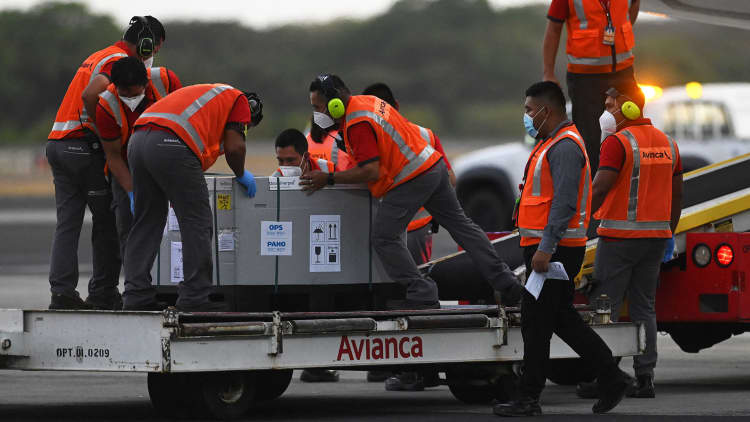LONDON — The International Monetary Fund wants $50 billion to be spent on ensuring a faster rollout of coronavirus vaccines, saying it could ultimately generate returns of $9 trillion for the global economy.
The IMF on Friday called for at least 40% of the global population to be vaccinated by the end of the year, and at least 60% by June 2022. Only about 9.5% of the global population has received at least one dose, according to Our World in Data.
"No country can return to normalcy until all countries can defeat the pandemic," the IMF said in a new report entitled "A proposal to end the Covid-19 pandemic."
To achieve this, the Fund said there needs to be a global effort to invest another $50 billion to bolster the global vaccination program. This additional amount would be used to increase the COVAX vaccine coverage to 30% of the globe, procuring additional tests, and expanding vaccine production capacity. COVAX is an international partnership to ensure an equitable distribution of doses.
How to fund it?
The IMF suggested that at least $35 billion could come from public, private and multilateral donors, with the remainder coming from governments, potentially supported by multilateral agencies.
It said there is already at least $15 billion available from Covid-19 financing facilities created by development banks, such as the World Bank and the Asian Development Bank.
"The IMF can also play its role to help countries meet their financing needs — supporting countries' own efforts to create fiscal space and potentially acting as a third-resort line of finance," the report said.

The Washington-based institution said in April that the global economy is expected to grow by 6% this year and by 4.4% in 2022. However, since the pandemic emerged, the IMF has warned of an uneven impact from the health crisis and the subsequent economic crisis.
"The social and economic costs of the pandemic continue to rise and already diverging recoveries between rich and poor nations looks to worsen," the IMF said in its proposal.
The plan comes as the leaders of the 20 largest global economies gather virtually on Friday to discuss how to cooperate in the fight against the pandemic.
"We believe addressing the pandemic remains our foremost priority," Italian Prime Minister Mario Draghi, the host of the meeting, said ahead of the global summit.
Ursula von der Leyen, the European Commission president, said the meeting aims to gather commitments and investments that will guide the next decade of global health cooperation.
Patent waiver
One of the most recent topics of debate in the fight against the virus has been over patent waivers.
The United States surprised its European counterparts when earlier this month it expressed support for a lifting of intellectual property rights for Covid vaccines. Supporters of the idea say it is critical to ramp up vaccination rates in low-income nations.
However, the EU disagrees, arguing that boosting exports of the shots is the most efficient solution in the short term.
The EU and the U.S. have taken different approaches to supporting other nations. The U.S. introduced legislation that only allows it to export a significant amount of Covid-19 vaccines once it is satisfied with the levels of inoculation within its own borders. On the other hand, the EU claims it is the biggest exporter of Covid shots in the world, exporting half of what it has produced.



